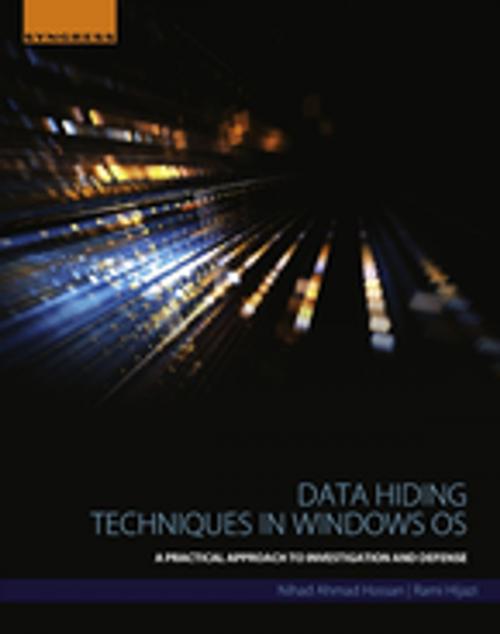Data Hiding Techniques in Windows OS
A Practical Approach to Investigation and Defense
Nonfiction, Computers, Networking & Communications, Computer Security, Operating Systems, Application Software| Author: | Nihad Ahmad Hassan, Rami Hijazi | ISBN: | 9780128044964 |
| Publisher: | Elsevier Science | Publication: | September 8, 2016 |
| Imprint: | Syngress | Language: | English |
| Author: | Nihad Ahmad Hassan, Rami Hijazi |
| ISBN: | 9780128044964 |
| Publisher: | Elsevier Science |
| Publication: | September 8, 2016 |
| Imprint: | Syngress |
| Language: | English |
-
"This unique book delves down into the capabilities of hiding and obscuring data object within the Windows Operating System. However, one of the most noticeable and credible features of this publication is, it takes the reader from the very basics and background of data hiding techniques, and run’s on the reading-road to arrive at some of the more complex methodologies employed for concealing data object from the human eye and/or the investigation. As a practitioner in the Digital Age, I can see this book siting on the shelves of Cyber Security Professionals, and those working in the world of Digital Forensics – it is a recommended read, and is in my opinion a very valuable asset to those who are interested in the landscape of unknown unknowns. This is a book which may well help to discover more about that which is not in immediate view of the onlooker, and open up the mind to expand its imagination beyond its accepted limitations of known knowns." - John Walker, CSIRT/SOC/Cyber Threat Intelligence Specialist
-
Featured in Digital Forensics Magazine, February 2017
In the digital world, the need to protect online communications increase as the technology behind it evolves. There are many techniques currently available to encrypt and secure our communication channels. Data hiding techniques can take data confidentiality to a new level as we can hide our secret messages in ordinary, honest-looking data files.
Steganography is the science of hiding data. It has several categorizations, and each type has its own techniques in hiding. Steganography has played a vital role in secret communication during wars since the dawn of history. In recent days, few computer users successfully manage to exploit their Windows® machine to conceal their private data.
Businesses also have deep concerns about misusing data hiding techniques. Many employers are amazed at how easily their valuable information can get out of their company walls. In many legal cases a disgruntled employee would successfully steal company private data despite all security measures implemented using simple digital hiding techniques.
Human right activists who live in countries controlled by oppressive regimes need ways to smuggle their online communications without attracting surveillance monitoring systems, continuously scan in/out internet traffic for interesting keywords and other artifacts. The same applies to journalists and whistleblowers all over the world.
Computer forensic investigators, law enforcements officers, intelligence services and IT security professionals need a guide to tell them where criminals can conceal their data in Windows® OS & multimedia files and how they can discover concealed data quickly and retrieve it in a forensic way.
Data Hiding Techniques in Windows OS is a response to all these concerns. Data hiding topics are usually approached in most books using an academic method, with long math equations about how each hiding technique algorithm works behind the scene, and are usually targeted at people who work in the academic arenas. This book teaches professionals and end users alike how they can hide their data and discover the hidden ones using a variety of ways under the most commonly used operating system on earth, Windows®.
-
"This unique book delves down into the capabilities of hiding and obscuring data object within the Windows Operating System. However, one of the most noticeable and credible features of this publication is, it takes the reader from the very basics and background of data hiding techniques, and run’s on the reading-road to arrive at some of the more complex methodologies employed for concealing data object from the human eye and/or the investigation. As a practitioner in the Digital Age, I can see this book siting on the shelves of Cyber Security Professionals, and those working in the world of Digital Forensics – it is a recommended read, and is in my opinion a very valuable asset to those who are interested in the landscape of unknown unknowns. This is a book which may well help to discover more about that which is not in immediate view of the onlooker, and open up the mind to expand its imagination beyond its accepted limitations of known knowns." - John Walker, CSIRT/SOC/Cyber Threat Intelligence Specialist
-
Featured in Digital Forensics Magazine, February 2017
In the digital world, the need to protect online communications increase as the technology behind it evolves. There are many techniques currently available to encrypt and secure our communication channels. Data hiding techniques can take data confidentiality to a new level as we can hide our secret messages in ordinary, honest-looking data files.
Steganography is the science of hiding data. It has several categorizations, and each type has its own techniques in hiding. Steganography has played a vital role in secret communication during wars since the dawn of history. In recent days, few computer users successfully manage to exploit their Windows® machine to conceal their private data.
Businesses also have deep concerns about misusing data hiding techniques. Many employers are amazed at how easily their valuable information can get out of their company walls. In many legal cases a disgruntled employee would successfully steal company private data despite all security measures implemented using simple digital hiding techniques.
Human right activists who live in countries controlled by oppressive regimes need ways to smuggle their online communications without attracting surveillance monitoring systems, continuously scan in/out internet traffic for interesting keywords and other artifacts. The same applies to journalists and whistleblowers all over the world.
Computer forensic investigators, law enforcements officers, intelligence services and IT security professionals need a guide to tell them where criminals can conceal their data in Windows® OS & multimedia files and how they can discover concealed data quickly and retrieve it in a forensic way.
Data Hiding Techniques in Windows OS is a response to all these concerns. Data hiding topics are usually approached in most books using an academic method, with long math equations about how each hiding technique algorithm works behind the scene, and are usually targeted at people who work in the academic arenas. This book teaches professionals and end users alike how they can hide their data and discover the hidden ones using a variety of ways under the most commonly used operating system on earth, Windows®.















